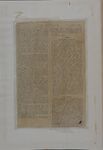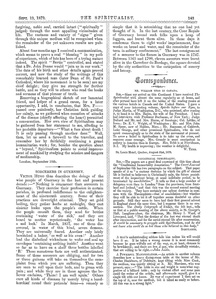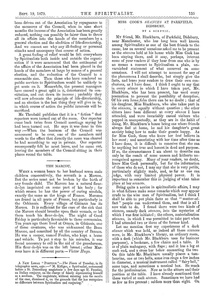< Dreams (continued from page 10-43) >
where the murder was committed . . . My brother knocked Mr. Norway down; he snapped a pistol at him twice, and it did not go off. He then knocked him down with the pistol. I was there along with him. Mr. Norway was struck while on horseback. It was on the turnpike-road, between Pencarrow Hill and the directing post toward Wadebridge. I cannot say at what time of the night it was. We left the body in the water, on the left side of the road coining to Wadebridge. We took some money in a purse, but I did not know how much. My brother drew the body across the road to the watering.”
What can the theory of chance or coincidence do in this case? Simply nothing. “A more complete series of correspondences between dream and reality can hardly be imagined. . . . The various coincidences, taken together, as proof that chance is not the tine explanation, have all the force of a demonstration in Euclid.”
And there is no reason to believe that such visions of the night are caused by miraculous intervention. Indeed, many of the mysteries of the day which have been made clear by the visions of the night are of too ordinary a nature for miraculous interference. Take, for example, the following, for the truth of which Dr. Abercrombie vouches:—
“A lady in Edinburgh had sent her watch to be repaired. A long time elapsed without her being able to recover it; and, after many excuses, she began to suspect that something was wrong. She now dreamed that the watchmaker’s boy, by whom the watch was sent, had dropped it in the street, and had injured it in such a manner that it could not be repaired. She went to the master, and, without any allusion to her dream, put the question to him directly, when he confessed that it was so.”
We see no miracle or supernatural interference in this case, nor in any of the cases cited. We see in such visions of the night simply an extension of that order which -we find in the physical world. What is called miracle is simply the higher power—spirit controlling the lower—matter. And “in certain exceptional conditions of the human system, as occasionally during dreams, or under other circumstances when the will is surrendered, some . . . occult intelligence other than our own may not, for a time and to a certain extent, possess itself of the power to employ the cerebral mechanism so as to suggest or inspire thoughts and feelings which, though in one sense our own, yet come to us from a foreign source.”
Only occasionally are we favoured with the verifiable presence of the inhabitants of the spirit land. But often, when we see them not, they may be near us, suggesting wisdom to us and guiding us, as really as the stronger wills on earth form and guide the weaker ones.
Clairvoyant dreams are only a part of the varied and remarkable things of spirit life. And before they are despatched to the region of lawless fancy, or the limbo of superstition, by the reader, he will do well to give the subject a careful and thorough consideration. After such consideration, he will probably have a clearer look out on the spirit home beyond the grave than he ever had before.
And to the frequent question, “What is the use of Spiritualism? he will be able to answer—the certainty of a future life of spiritual progress for all mankind. And he will be able to speak with confidence of the blessed communion which the dwellers in time have with the inhabitants of the spirit land.
Hull, September 13th, 1879.
Sorcerers in Guernsey
Victor Hugo thus describes the doings of the wise people of Guernsey in the last and present decade:—“Nothing is commoner than sorcerers in Guernsey. They exercise their profession in certain parishes, in profound indifference to the enlightenment of the nineteenth century. Some of their practices are downright criminal. They set gold boiling, they gather herbs at midnight, they cast sinister looks upon the people’s cattle. When the people consult them, they send for bottles containing 1 water' of the sick,’ and they are heard to mutter mysteriously, ‘the water has a sad look.’ In March, 1857, one of them discovered, in water of this kind, seven demons. They are universally feared. Another only lately bewitched a baker, 1 as well as his oven!’ Another bad the diabolical wickedness to wafer and seal up envelopes ‘containing nothing inside!’ Another went so far as to have on a shelf three bottles labelled ‘B.’ These monstrous facts are well authenticated. Some of these sorcerers arc obliging, and for two or three guineas will take on themselves the complaint from which you are suffering. Then they are seen to roll upon their beds, and to groan with pain; and while they are in these agonies the believer exclaims, ‘There! I am well again Others cure all kinds of diseases by merely tying a handkerchief round their patients’ loins—a remedy so simple that it is astonishing that no one had yet thought of it. In the last century, the Cour Royale of Guernsey bound such folks upon a heap of faggots, and burnt them alive. In these days it condemns them to eight weeks’ imprisonment, four weeks on bread and water, and the remainder of the term in solitary confinement.” The last consignment of a sorcerer to the flames in Guernsey was in 1747. Between 1565 and 1700, eleven sorcerers were burnt alive in the Carrefour du Bordage, the square devoted by the city authorities to the extirpation of sorcery and heresy.
The Marcou
When a woman bears to her husband seven male children consecutively, the seventh is a Marcou. But the series must not be broken by the birth of any female child. The Marcou has a natural fleur-de-lys imprinted on some part of his body; for which reason he has the power of curing scrofula, exactly the same as the kings of France. Marcous are found in all parts of France, but particularly in the Orleanais. Every village of Gatinais has its Marcou. It is sufficient for the cure of the sick that the Marcou should breathe upon their wounds, or let them touch his fleur-de-lys. The night of Good Friday is particularly favourable to these ceremonies. Ten years ago there lived at Ormes, in Gatinais, one of these creatures, who was nicknamed the Beau Marcou, and consulted by all the country of Bcauce. He was a cooper, named Foulon, who kept a horse and vehicle. To put a stop to his miracles, it was I found necessary to call in the aid of the gensdarmes. His fleur de-lys was on the left breast; other Marcous have it in different parts.—Victor Hugo.
Editor's notes
Sources
-
London Spiritualist, No. 369, September 19, 1879, p. 143
-
London Spiritualist, No. 369, September 19, 1879, p. 135



